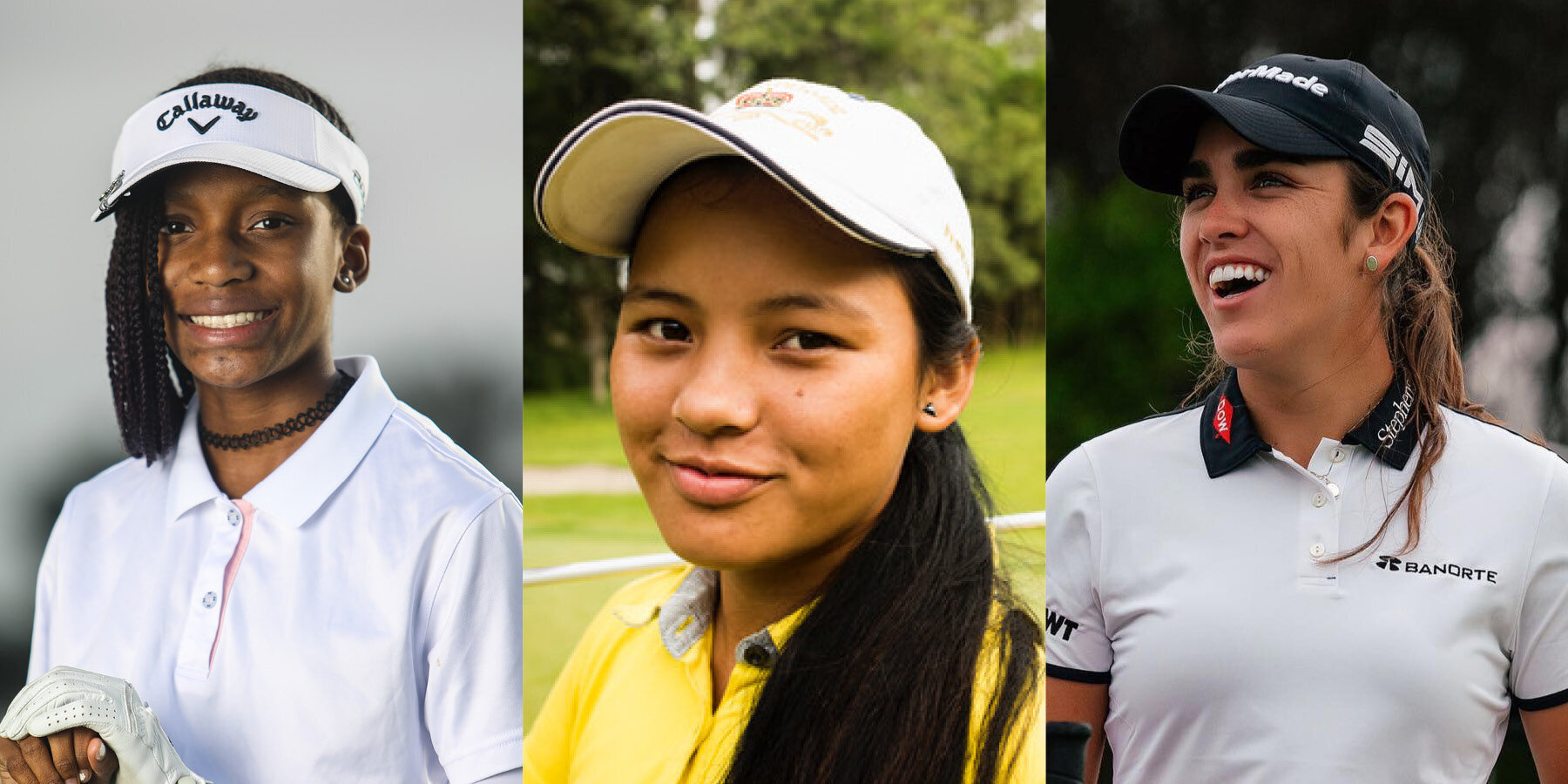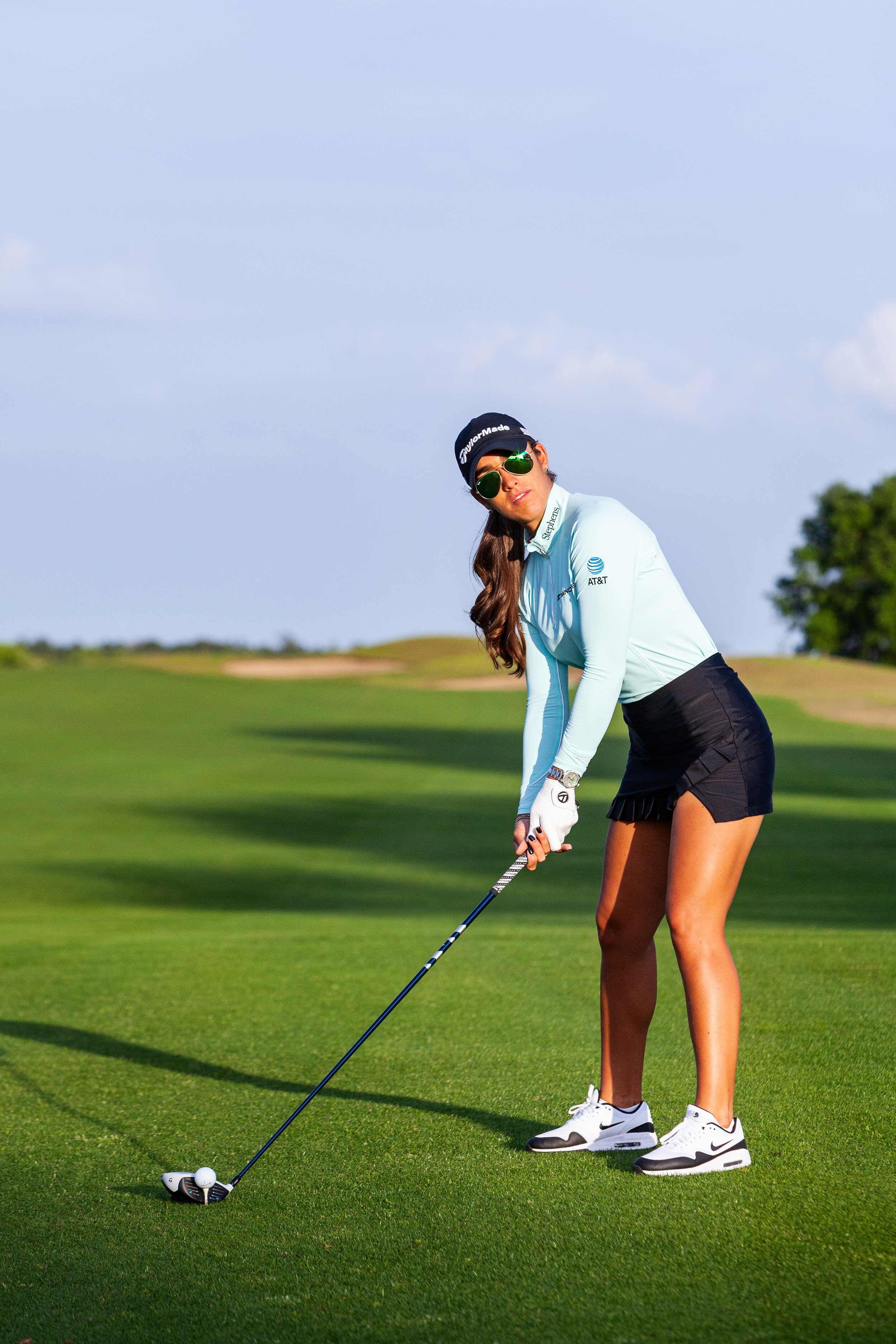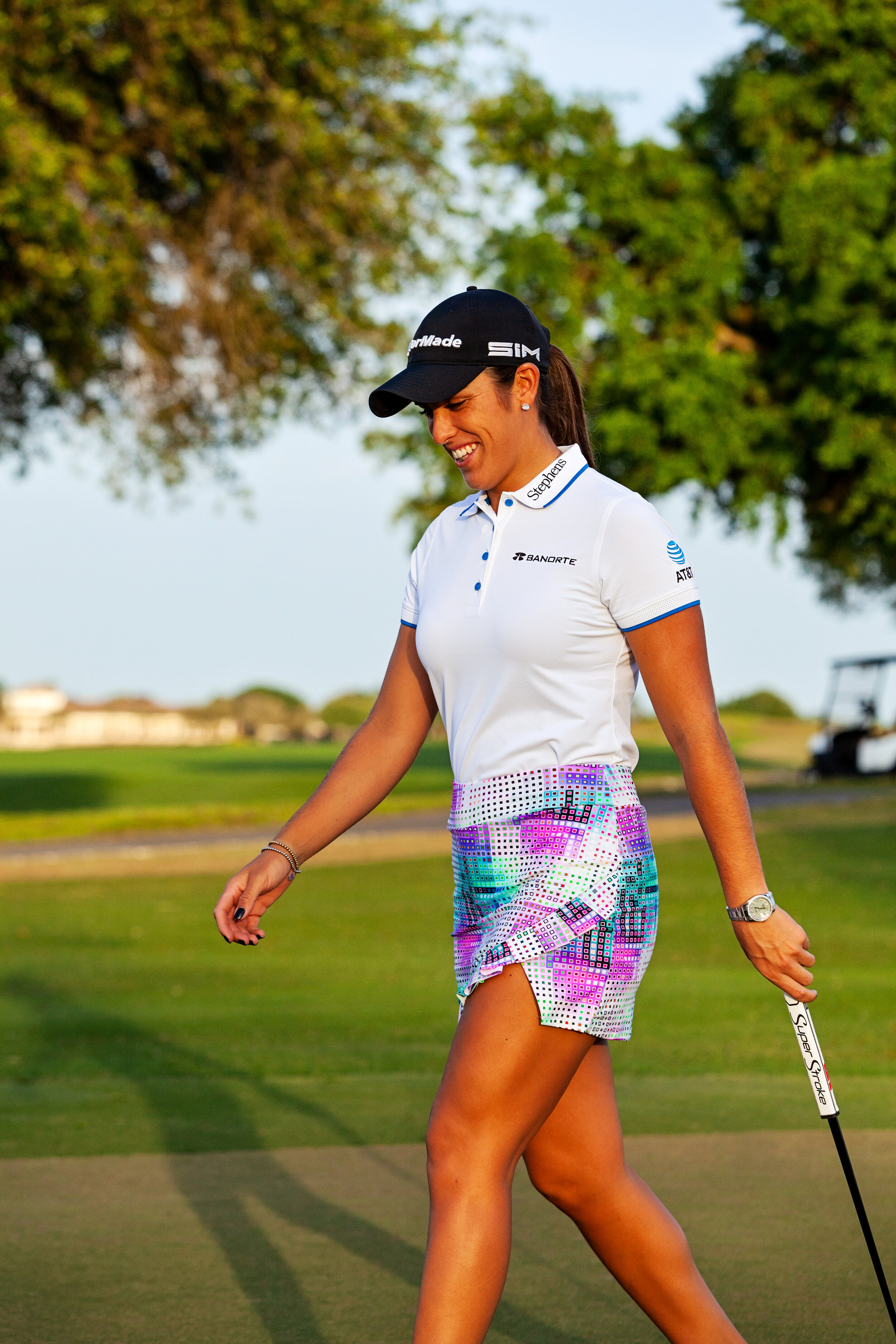The female golfers taking a swing at the establishment
When it comes to being inclusive, the golfing world isn’t up to par — but these young women from Nepal, Nigeria and Mexico are working to change that.
Golf is a male-dominated sport. Just look at the numbers: only 23% of on-course golfers in the U.S. are female. Discrimination is rooted in the sport’s history. The modern game of golf emerged in the 18th century as a “men’s sport” and subsequently, clubhouses became social spaces for wealthy men to meet and discuss business. Eventually, these clubs welcomed women and working-class players by creating separate “ladies” sections and artisan clubs — but restrictions still existed on when and where they could play. Throughout the game’s history, golf has also rejected people of colour, with clubs often refusing membership to Black golfers.
Today, the restrictions don’t look as obvious, but golf continues to be an exclusionary sport. It’s often accessible only to those who can afford expensive club memberships and equipment. Many clubs around the world were for men only, even until 2019. And private clubs are still able to legally discriminate on the basis of sex. While the number of golfers of colour is increasing, the sport is still predominantly White and racial discrimination continues to plague the sport’s recent history.
That’s one of the reasons it’s so exciting to see young female golf stars like Nepal’s Pratima Sherpa, Nigeria’s Iyene Essien and Mexico’s Maria Fassi walk onto the green. Through their leadership on and off the course, they’re changing the sport’s landscape for the next generation of golfers.
I spoke to Pratima, Iyene and Maria about their golfing careers, their hopes for the future and their work making sure the sport they love is accessible to everyone.
(Courtesy of Pratima Sherpa)
Pratima Sherpa, 19, Nepal
“No one thought I’d be where I am today because golf is an expensive game and I’m a girl on top of that,” Pratima says.
Born and raised in a maintenance shed of a golf club where her parents still work, Pratima remembers when she would light a torch at night to practice once “the real players” had cleared out the golf course where she lived. Her first golf club was a makeshift one her father carved out of a tree branch.
Today, Pratima is her country’s top-ranked female golfer.
And her feat is even more impressive when you consider that Nepal has only four golf clubs and, according to Pratima, they’re “mostly frequented by rich men.” As a young woman in the sport, other players often undermined her on the golf course. Once at a major tournament in Nepal where Pratima was the only female golfer, she overheard a player ask his peers why a girl was participating. “She’s just going to slow down the game,” she remembers him saying. To the player’s surprise, Pratima played three under par that day and earned the best score of the tournament.
Now, Pratima’s accomplishments make international headlines (check out her feature in major outlets like CNN and South China Morning Post). This year, Forbes named her to their 30 under 30 Asia 2020 list for entertainment and sports.
“No one thought I’d be where I am today because golf is an expensive game and I’m a girl on top of that.”
After making history last year when she became the first Nepali woman to compete in the Ladies Professional Golf Association (LPGA) Tour, Pratima has her sights set on her next goal: becoming her country’s first female professional golfer. In 2022, when Pratima finishes college, she will be eligible again to compete in the Q School tournament and try for professional status in Nepal.
But even her astounding success hasn’t spared Pratima from discrimination. In fact, sometimes critics use her achievements against her. When Pratima started to win most of her games, her peers would ask her not to compete in women’s tournaments because they believed Pratima’s participation meant other female golfers wouldn’t have the chance to win. “I was told to play with the boys instead,” she says. But Pratima ignored the criticism and continued competing — and winning.
Pratima decided early on in her career that she wanted to use her voice to help Nepal’s young women play and succeed in golf. “I’m not just a golfer, I’m a symbol of hope for girls,” she says. “All the opportunities I received, I want to give to young Nepali golfers.” Pratima’s plans for the future include opening a golf foundation that supports Nepali golfers like her who don’t have the means to play the sport.
Pratima’s story and success is already improving other girls' access to golf in Nepal. “People are seeing that if someone like me, who came from nothing, can be where I am today, where no one expected me to be, their daughters can too,” she shares. “Many parents have come to me and said, ‘We want to make our daughter like you.’”
But in order for girls to really have access to golf in Nepal, Pratima believes the government needs to invest funds to popularise the sport. Growing up, Pratima saw many government officials playing on her golf course. Her request to them is simple: “Think about supporting children who want to play too.”
And to girls in Nepal, she says: “We are taught to think we’re less than boys and we believe it. So I want to ask you to stop thinking that way. I did too when I was younger and I was wrong.”
(Courtesy of Iyene Essien)
Iyene Essien, 13, Nigeria
Iyene Essien picked up her first golf club when she was 5 years old. Fast-forward eight years and the 13-year-old is now Nigeria’s top junior golfer, with 17 medals and 11 international tournaments under her belt.
Around the country, girls look up to Iyene for inspiration, but when she was starting out in the sport, Iyene didn’t have anyone who looked like her to idolise. “Not a lot of girls know that golf exists because they don't really hear of famous girl golfers or women golfers that play the game,” she says.
Iyene first became interested in golf when she accompanied her father to a golf club in Abuja and saw a young White boy practicing. Iyene was dazzled by the elegance of the sport so when her father asked if she wanted to take up golf just like the boy she saw, her answer was an unequivocal yes.
Since then, Iyene has earned many medals — her first one was at age 5, the same year she picked up the sport. Most recently, Iyene took 10th place at the 2019 Nigeria Ladies Golf Open Championship, where she was the only teen player out of 177 golfers.
While Iyene wishes more Nigerians girls were interested in golf, she knows the sport isn’t accessible to everyone. “[Golf] is an expensive sport to start — you have to buy clubs, continually pay a coach to train you and go to tournaments.” she says. “It is an elitist game.” Iyene hopes her government will put more effort into introducing the game to young girls and boys in the country and fund their training.
Iyene wants to show other Nigerian girls that they can pursue any career they’re passionate about. “If [girls] see that what I’m doing is actually making me famous and I seem to enjoy it, they might like to find a profession that they will love to do in the future and also be noticed for their efforts,” she says.
Often at her international tournaments, Iyene is the only Nigerian competing. Although it can be uncomfortable, she says she feels even more encouraged to prove that girls like her are training and “they're ready to take over the world.”
Before the pandemic, Iyene was scheduled to captain the girls’ golf team at the all-African junior tournament in Egypt. Although she’s disappointed the event is postponed, Iyene’s already planning ahead to when she’s back on the course. Her next goal: bringing home Nigeria’s first-ever gold medal for golf at the 2022 Summer Youth Olympics.
(Courtesy of Maria Fassi)
Maria Fassi, 22, Mexico
Maria Fassi is no stranger to being the only girl on a golf course — it’s how her career began. As a kid, Maria would tag along with her golf-loving brothers and watch them play from the sidelines on a small course in Pachuca, Mexico. One day she decided she had done enough watching. “I picked up a golf club and started swinging,” she says.
“[Golf] was always a father and son thing,” Maria shares. “It’s a very male-dominated sport.” That’s why she wasn’t sure if golf was a viable career for her until she had the chance to play a round with Mexican golfer Lorena Ochoa. At the time Maria was 12 years old and Lorina was the top-ranked female golfer in the world. Getting to know a successful Mexican female golfer gave Maria hope about her own future. She recalls thinking: “This is the person I want to be for another young girl.”
Maria did just that. After she was recruited to play golf at the University of Arkansas, Maria climbed the ranks of women’s amateur golf. She was a 2018 Arnold Palmer Cup International team selection and won the coveted Annika Award twice, a recognition presented annually to the top female collegiate golfer in the U.S. Last year, she joined the LPGA Tour and just over a year later, the 22-year-old earned her first professional win at the Cooper Communities NWA Classic in Arkansas in June.
But for Maria, nothing tops how it feels to represent Mexico: “Being able to play for my country and represent the Mexican flag on my shoulders — I think that’s the coolest thing that’s ever happened to me.”
Getting here hasn’t always been easy. Maria has faced discrimination from others in the sport. “Being here in the U.S, I am Latina, I am Mexican, I am definitely a minority and I’m a girl — it was hard for me in college to just get over being O.K. with who I was and really not listening to what some people were saying about my worth, just because I didn’t look like them,” she shares.
Although she has only been pro for a year, Maria is already thinking about ways to “give back to the golf world.” She wants to help women in golf get the acknowledgement they deserve. “I would like to bring more media coverage to women's golf,” she says. She also wants to invest in a foundation that makes golf more accessible and nurturing for girls with a disability. She envisions being able to provide the right tools and help “uplift the self-worth” of girls who want to play but might need special care — girls like her golf-loving cousin Josefina who has a mental and physical disability.
Maria’s immediate goal is winning a medal for Mexico at the 2021 Olympics. She knows that even though she has been practicing six hours a day and trying her best to stay in form, going back to competing after the pandemic will be a challenge. But she maintains a positive attitude.
In golf, “either you win or you learn, but you never lose,” she says.


 Read more
Read more

















